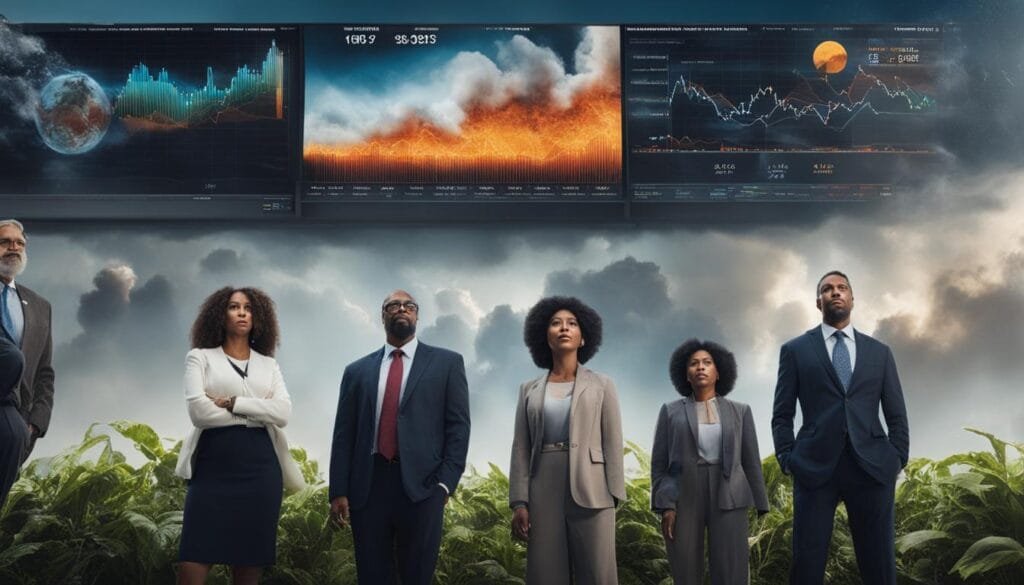The intersection of climate change and financial literacy is a pressing issue that demands our attention. As the world grapples with the effects of a warming planet, understanding how our financial decisions can contribute to sustainable solutions is more important than ever.
By promoting eco-financial literacy, we can empower individuals to make informed choices about their money and investments. This knowledge is crucial for mitigating the impact of climate change and creating a more sustainable future.
Key Takeaways:
- Financial literacy plays a vital role in addressing climate change and promoting sustainable finance knowledge.
- Eco-financial literacy empowers individuals to make informed decisions about their money and investments.
- Boosting financial literacy in a warming world is crucial for creating a more sustainable future.
- Sustainable finance knowledge enables individuals to contribute to the transition to a greener economy.
- By investing in financial literacy programs, we can drive sustainable economic growth and build a more resilient society.
The Importance of Financial Literacy in the SME Sector
Small and medium-sized enterprises (SMEs) play a vital role in economic development and are essential drivers of innovation and job creation. However, when it comes to climate change, many SMEs face unique challenges and barriers that hinder their ability to adapt and thrive in a warming world. One key barrier is the lack of financial literacy among SME owners and managers.
Financial literacy is the knowledge and understanding of financial concepts and the ability to apply them effectively in decision-making. In the context of climate change, financial literacy is crucial for SMEs to navigate the complexities of sustainable finance and make informed decisions about climate change adaptation and mitigation strategies.
By improving financial literacy in the SME sector, businesses can enhance their understanding of climate finance options, evaluate the financial viability of sustainable projects, and access the necessary funding and support to implement climate-friendly initiatives. Financially literate SMEs are better equipped to manage risks, seize opportunities, and contribute to the transition to a low-carbon economy.
Moreover, financial literacy empowers SMEs to effectively manage their financial resources, optimize cash flow, and make strategic investments that align with their long-term sustainability goals. By integrating financial literacy into training and educational programs for SME owners and managers, we can build a more resilient and environmentally conscious business sector that is capable of driving sustainable economic growth.
Mobilizing Private Climate Financing for Sustainable Development
Private sector financing plays a crucial role in driving sustainable development and addressing the challenges of climate change. However, there are several barriers that hinder the flow of money into climate projects, particularly in emerging markets and developing economies. High upfront costs, technical challenges, currency fluctuations, and political instability are some of the key constraints.
To unlock the potential of private climate financing, it is essential to address these barriers and provide incentives for private sector investment. By doing so, we can accelerate the transition to a low-carbon economy and promote sustainable development. One way to achieve this is through climate financial education, also known as green financial literacy or environmental financial literacy.
The Role of Climate Financial Education
Climate financial education equips individuals with the knowledge and skills to understand the financial aspects of climate change and make informed decisions. It helps individuals and organizations navigate the complexities of climate finance, assess investment opportunities, and manage risks. By increasing climate financial literacy, we can bridge the gap between the private sector and climate projects, facilitating greater investment in sustainable initiatives.
Climate financial education should cover various topics, including:
- The financial implications of climate change and the opportunities it presents
- Sustainable investment options and their potential risks and returns
- The role of financial institutions in supporting climate projects
- The importance of integrating environmental, social, and governance (ESG) factors into investment decisions
Creating an Enabling Environment
To mobilize private climate financing, it is crucial to create an enabling environment that fosters sustainable investments. This can be achieved through:
- Developing supportive policies and regulations that incentivize private sector involvement in climate projects
- Promoting transparency and disclosure of environmental risks and opportunities to enhance investor confidence
- Building capacity among financial institutions to evaluate and finance climate projects
- Establishing platforms for collaboration and knowledge-sharing between public and private stakeholders
Through climate financial education and the creation of an enabling environment, we can mobilize private climate financing and drive sustainable development. By empowering individuals and organizations with the knowledge and skills to make informed financial decisions, we can accelerate the transition to a greener, more resilient future.
| Benefits of Climate Financial Education | Challenges Addressed |
|---|---|
| Enhanced understanding of climate finance | Lack of awareness and knowledge about climate finance |
| Improved ability to assess investment opportunities | Technical challenges in evaluating climate projects |
| Reduced investment risks | High upfront costs and uncertainties |
| Increased private sector involvement in sustainable initiatives | Political instability and currency fluctuations |
Overcoming Obstacles to Private Climate Investments
In order to overcome the obstacles to private climate investments, it is crucial to take coordinated action from both the public and private sectors. By leveraging the expertise and resources of both sectors, we can drive sustainable economic growth and build a more resilient and environmentally conscious society.
One key aspect of overcoming these obstacles is through public sector financing. The public sector can play a significant role in de-risking investments for the private sector by providing equity investments and credit enhancements. This ensures that private companies have the necessary support to invest in climate projects and navigate the challenges associated with climate change.
Multilateral development banks also have a crucial role to play in mobilizing private climate financing. These banks can provide financial support, technical assistance, and policy advice to unlock private capital and drive sustainable investments. By leveraging their expertise and global reach, they can help bridge the gap between private investors and climate projects, especially in emerging markets and developing economies.
“Public sector financing can de-risk investments for the private sector through equity investments and credit enhancements.”
In addition to financial support, policy tools can also play a significant role in attracting private sector investments. Robust carbon pricing, for example, can create economic incentives for companies to invest in low-carbon technologies and reduce their carbon footprint. A strong climate information architecture is also crucial in providing transparent and reliable data that investors can use to make informed decisions.
| Public Sector Actions | Private Sector Actions |
|---|---|
| De-risk investments through equity investments and credit enhancements | Invest in climate projects |
| Provide financial support, technical assistance, and policy advice | Utilize expertise and global reach |
| Implement robust carbon pricing | Invest in low-carbon technologies |
| Establish a strong climate information architecture | Make informed investment decisions |
By addressing these obstacles and fostering collaboration between the public and private sectors, we can unlock the potential of private climate investments and accelerate the transition to a low-carbon economy. This will not only drive economic growth but also contribute to mitigating the effects of climate change and creating a more sustainable future for all.
The Role of Financial Literacy in Sustainable Development
Financial literacy plays a crucial role in achieving sustainable development goals by equipping individuals with the necessary knowledge, skills, and attitudes. It empowers individuals to make informed financial decisions that align with sustainable practices, ultimately contributing to the transition to a greener economy. By promoting financial literacy, we can create a more sustainable future for individuals, communities, and the planet.
One of the key benefits of financial literacy is its ability to enable individuals to manage their finances effectively. This includes budgeting, saving, and investing in sustainable projects. With a solid understanding of financial concepts, individuals can make informed decisions about their money and ensure that their financial choices align with their values and contribute positively to the environment.
Moreover, financial literacy also enables individuals to become active participants in the transition to a greener economy. By understanding the financial aspects of sustainability, individuals can identify and support sustainable investment opportunities. This includes investing in renewable energy projects, eco-friendly businesses, and environmentally responsible companies. By allocating their financial resources wisely, individuals can contribute to the growth of sustainable industries and drive positive change.
Financial literacy is not just about managing finances; it’s about empowering individuals to become agents of change in the pursuit of sustainability.
In summary, financial literacy is a key element in achieving sustainable development goals. By equipping individuals with the necessary knowledge, skills, and attitudes, we can empower them to make informed financial decisions that align with sustainable practices. Financial literacy enables individuals to manage their finances, invest in sustainable projects, and contribute to the transition to a greener economy. By promoting financial literacy, we can create a more sustainable future for individuals, communities, and the planet.

The Impact of Financial Literacy on Firm Performance
Financial literacy plays a crucial role in determining the performance of businesses, especially in the context of climate change. Research has shown that firms with higher levels of sustainable finance knowledge are more likely to make sound financial decisions and achieve sustainable performance. By understanding the financial implications of climate change and incorporating sustainable practices into their operations, financially literate firms are better equipped to adapt to changing market dynamics and capitalize on emerging opportunities.
“Financial literacy is not just about understanding basic financial concepts; it also involves recognizing the importance of sustainable finance and integrating environmental considerations into decision-making processes. Firms that prioritize financial literacy have a competitive advantage, as they are more likely to identify cost-saving measures, mitigate climate-related risks, and innovate in response to evolving environmental regulations.” – Financial Analyst, Green Investments Inc.
Financially literate firms also tend to have a better understanding of the long-term implications of climate change and are more proactive in implementing sustainable strategies. This includes investing in renewable energy technologies, adopting circular economy practices, and reducing carbon emissions. By aligning their business models with sustainable development goals, financially literate firms not only contribute to addressing climate change but also attract socially responsible investors and customers who prioritize environmental stewardship.
A comprehensive study conducted by the Sustainable Finance Initiative found that financially literate firms consistently outperform their peers in terms of profitability, market value, and risk management. The study also highlighted the positive correlation between financial literacy and innovation, with financially literate firms being more likely to develop and implement eco-friendly products and services. These findings underscore the importance of financial literacy in driving firm performance and highlight the need for businesses to prioritize sustainable finance knowledge.
The Role of Financial Literacy Programs
Investing in financial literacy programs for employees is a key strategy for enhancing firm performance in a warming world. By providing employees with the necessary knowledge and skills to navigate the complexities of sustainable finance, businesses can empower their workforce to make informed decisions that support both financial and environmental objectives. Financial literacy programs can include training on climate risk assessment, carbon accounting, sustainable investment strategies, and green procurement practices.
Furthermore, financial literacy programs can foster a culture of sustainability within organizations, encouraging employees to identify innovative solutions to environmental challenges and contribute to the overall success of the firm. By equipping employees with the tools they need to understand and address climate change, businesses can position themselves as leaders in the transition to a low-carbon economy and create a positive impact on society and the environment.
The Importance of Early Financial Education for Sustainable Futures
Early financial education plays a crucial role in shaping a sustainable future. By introducing financial literacy concepts to young learners, we can empower them with the knowledge and skills needed to make informed decisions, not only about their personal finances but also about the impact of their choices on the environment.
By incorporating climate change finance education into school curricula, we can cultivate a generation of eco-conscious individuals who understand the importance of green financial literacy. They will be equipped to navigate the challenges of a warming world, make sustainable money management decisions, and contribute to the transition to a greener economy.

The Benefits of Early Financial Education:
- Empowers young individuals by giving them the knowledge and skills to manage their finances responsibly.
- Instills a sense of responsibility and sustainability, enabling them to make informed choices about their financial decisions.
- Helps develop critical thinking skills, allowing them to evaluate the environmental impact of their financial choices.
- Creates a foundation for lifelong financial well-being, setting the stage for a sustainable and prosperous future.
Financial literacy education should not be a luxury, but a fundamental component of every child’s education. By providing early financial education with a focus on sustainability, we can shape a generation that is financially empowered and environmentally conscious, leading to a more sustainable future for all.
By prioritizing early financial education and integrating it with climate change finance education, we can sow the seeds of sustainable financial practices in the minds of young learners. This investment in their financial literacy will pay dividends not only for their personal well-being but also for the future of our planet.
| Benefits of Early Financial Education | Benefits of Climate Change Finance Education |
|---|---|
| Develops responsible money management skills. | Enhances understanding of the financial impact of climate change. |
| Empowers individuals to make informed financial decisions. | Equips individuals with the knowledge to invest in sustainable projects. |
| Creates awareness of the importance of sustainability. | Encourages individuals to contribute to the transition to a greener economy. |
| Builds a foundation for lifelong financial well-being. | Fosters a generation that understands the financial challenges posed by climate change. |
Conclusion
In conclusion, financial literacy plays a crucial role in addressing the challenges of climate change and promoting sustainable development. By equipping individuals, businesses, and communities with sustainable finance knowledge, we can empower them to make informed decisions that have a positive impact on the environment.
Through eco-financial literacy, individuals can understand the importance of sustainable investments and contribute to mitigating the effects of climate change. By promoting early financial education, we can ensure that future generations are equipped with the necessary skills to navigate the complexities of a warming world.
Mobilizing private climate financing is another key aspect of building a sustainable future. By addressing barriers and providing incentives for investment, we can unlock the potential of the private sector in driving the transition to a low-carbon economy.
By harnessing the power of financial literacy, we can drive sustainable economic growth, build a resilient society, and create a greener future for all. It is essential that we continue to prioritize and invest in financial literacy initiatives to ensure a more sustainable and environmentally conscious world.
FAQ
What is the importance of financial literacy in the context of climate change?
Financial literacy is crucial in addressing climate change as it enables individuals and businesses to make informed decisions about sustainable investments and eco-friendly financial practices.
How does financial literacy impact small and medium-sized enterprises (SMEs) in relation to climate change?
Financial literacy plays a vital role in helping SMEs navigate the challenges of climate change and develop sustainable strategies for long-term growth.
What are some barriers that prevent private sector financing in climate projects?
High upfront costs, technical challenges, currency fluctuations, and political instability are some of the barriers that hinder private sector investments in climate projects, particularly in emerging markets and developing economies.
How can private climate investments be encouraged and supported?
Coordinated action from both the public and private sectors is needed to de-risk investments, provide financial support, and create policy tools such as carbon pricing and climate information architecture to attract private sector capital and promote transparency.
How does financial literacy contribute to sustainable development goals?
Financial literacy empowers individuals to make informed financial decisions that align with sustainable practices, manage their finances, and invest in sustainable projects, ultimately leading to a greener economy and a more sustainable future.
What is the impact of financial literacy on firm performance in the face of climate change?
Firms with higher levels of financial literacy are more likely to make sound financial decisions, adapt to changes in the business environment, manage risks, and capitalize on opportunities presented by climate change, resulting in sustainable performance.
Why is early financial education important for building a sustainable future?
Introducing financial literacy concepts at a young age equips future generations with the knowledge and skills necessary to make informed decisions about their finances and the impact of their choices on the environment, fostering eco-conscious individuals who can navigate the challenges of a warming world.
How Can I Balance My Philanthropic Efforts with My Personal Finances?
Balancing climate philanthropy and personal finance can be a challenge. However, there are ways to manage both effectively. Start by setting clear financial goals and budgeting accordingly. Consider allocating a specific percentage of your income towards philanthropic efforts. Additionally, seek opportunities to make sustainable choices in your everyday life, such as reducing carbon emissions and supporting eco-friendly initiatives. Prioritize your values while ensuring financial stability.
What are the Potential Financial Impacts of Climate Legislation?
Climate legislation can have significant financial impacts on individuals’ wallets. As new regulations are implemented to combat climate change, industries may face increased costs, potentially leading to higher prices for goods and services. Additionally, individuals could see changes in their energy bills as renewable energy sources are promoted. Adapting to these changes requires careful planning to ensure a sustainable and affordable future. Climate legislation and your wallet are intricately connected, and understanding these potential financial impacts is essential.

